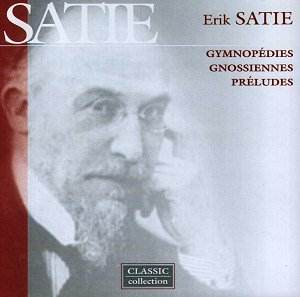The Norwegian Håkan Austbø has,
as aficionados of his Messiaen
discs for Naxos will appreciate, impeccable credentials in
the French piano repertoire. This bargain reissue of material
recorded, only three years ago, for the Arts Music label, is a
very welcome addition to the bulging catalogue of Satie's music.
I can take or leave this composer's "iconoclastic" ballets but
the piano music is something else again. The Gymnopédies
and Gnossiennes are widely known and recorded (and justifiably
so!). However, I take particular delight from the sheer number
of lesser known but often even more essential pieces discs such
as this and, say, John White's for Arte Nova, throw up.
For those who know only the aforementioned and
celebrated pieces, I would say that Satie's piano music is generally,
perhaps contrary to the popular image of the composer, simple
but profound, often deeply melancholy but in a spare and devotional
sense rather than a wallowing one, and always desperately, achingly
beautiful. The only contemporary composer who comes anywhere close,
for this listener, is Howard Skempton. This recording is up there
with the recent greats - apart from White, Rogé and Lenehan
(the latter despite an unsympathetic recording) stand out. Beyond
that we are back to the authoritative recordings by Dickinson
and McCabe.
Apart from his idiomatic readings of the best
known works (the Gnossiennes are particularly distinguished),
Austbø offers us the Sarabandes and the Préludes
du Nazaréen, the first of which is an austere and haunting
masterpiece. After the Prélude de la Porte Héroique
du Ciel, which is less portentous than the title might suggest,
the recital ends with the brief Pièces Froides and
the wistful Petite Ouverture à Danser.
This is an excellent disc, especially when offered
at such a low price, but I would strongly advise anyone who enjoys
it to purchase John White's recording as well (£5.99 or less).
There is a little overlap but White includes much more of the
Rosicrucian music which, I would suggest, gives a greater insight
into the real Satie (and his esoteric orientation). White provides
a valuable contrast to the received wisdom of Satie as vaudeville
eccentric, a view to which a casual listen to the orchestral works
might well lend credence. The only criticism I would make of this
CD is that documentation seems to have been sacrificed in favour
of presentation - slipcase or "sleevenotes", I know which I would
prefer!
Neil Horner
